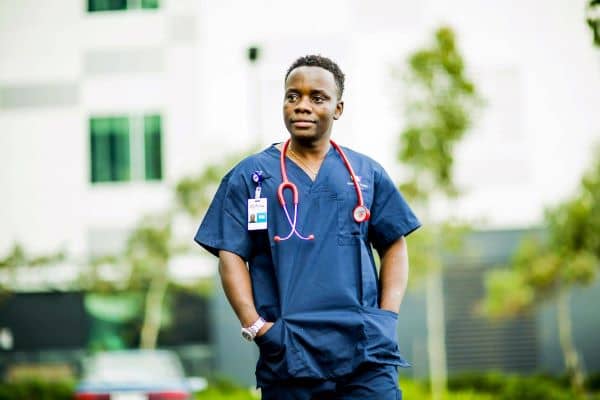Thank You, Nurses
by Carson-Newman … on March 28, 2022
This blog has been updated on May 7, 2024.
Thank you, Nurses for all that you do.
The entire country is celebrating you for your courage, resilience, and commitment to promoting the health and well-being of others. With May being recognized as National Nurses Month by the American Nurses Association (ANA), we’re expressing our heartfelt gratitude for our nurses and future nurse leaders.
At Carson-Newman University, we’re proud to support you in your educational journey and are grateful for all you do.
We encourage you to use National Nurses Month as a reason to step back and enjoy some well-deserved time to recharge. While you’re celebrating your wins from the past year, read our latest blog to reflect on the ways that you’ve made a difference.
Let’s take a look at just some of the ways nurses touch our lives, from our first breath to our golden years.
Thank You, Nurses, for Educating Communities
In your role as a nurse, you’re usually the first and most frequent person that patients interact with. Whether it’s by the bedside or remotely, you’ve developed a keen understanding of your patients.
You know their symptoms, their history, personal dynamics, and anxieties.
That patient rapport you’ve cultivated serves as a springboard to change lives for the better. Nurses implement evidence-based treatment plans that balance individual needs with the wide body of available research. You are the ones keeping the care process human!
One study reports that out of patients who experienced heart failure, those who received nurse-directed education on lifestyle modifications, diet, and medication compliance showed significant improvement in their quality of life—ranging from overall health and function to social, psychological, and spiritual well-being.
Thanks to your guidance, commitment to patient education, and professional expertise, individuals, families, and communities can live healthier, happier lives.
Carson-Newman’s Program Director, Dr. Kimberly Bolton, says it best, “If we truly want to make an impact on disease processes, then we have to start education for prevention and maintenance every time [we meet with a patient].”
Read more from Dr. Bolton in our blog here.
Nurses and FNPs raised awareness about COVID-19 throughout the pandemic, promoted best practices for safety precautions, and dispelled misinformation.
Since then, nurses have navigated increasingly fraught (and at times politicized) national conversations about the role of health care experts in policy decisions. Nurses continue to serve on the front lines of putting patients first and defining industry standards that will benefit populations as well as people.
You’ve also been instrumental in migrating care to virtual platforms, and teaching both your patients and your peers how to navigate new technologies—and never skipped a beat while you learned.

Thank You, Nurses, for Advocating for Patients
Nurses are, first and foremost, advocates. It’s the profound ability to genuinely connect with people and provide patient-centered care that makes nurses shine.
Nurses are the ones who connect on a person-to-person level with patients, spending real time getting to know them and asking about their day. Nurses are the providers asking about pain levels, performing intake assessments, and inquiring about family histories. Whether a person is in the hospital or in another health care setting, they will likely spend more time with their nurses than with any other type of healthcare worker during that time.
This one-on-one connection means nurses care and champion their patient’s feelings and needs.
In addition to day-to-day advocacy, many nurses have found inspiration to expand their reach by aspiring to the FNP role. With their ability to treat individuals, families, and communities, FNPs can advocate on both an immediate and long-term scale.
“People do not need to be treated like a number. They need to be treated with compassion, they need to be treated with respect,” says Rhonda McAnally, a student of Carson-Newman’s online MSN-FNP program.
Hear more about what Rhonda hopes to accomplish as an FNP.
Thank You, Nurses, for Your Emotional Support
Like many leaders, nurses are vulnerable to feeling the pressure of their roles, and can sometimes experience burnout or compassion fatigue.
The American Psychological Association identifies some symptoms of compassion fatigue such as:
- Loss of productivity
- Depression
- Intrusive thoughts
- Jumpiness and/or tiredness
- Feelings of being on edge
- Inability to separate personal and professional life
Despite the emotional toll it takes to be a nurse in today’s dynamic health care environment, you still carry on.
Click here for tips on how you can care for yourself as a nurse.
You’re there to ease fears, listen as we vent frustrations, voice our concerns about symptoms, and celebrate with us when we reach survivorship. Whether a person is receiving a diagnosis or undergoing dialysis, it is you, nurses, who extend a comforting hand to hold.
The emotional support you’ve provided has not only impacted lives but reinforced the value and societal need for nurses.
Thank you, nurses, for demonstrating what it means to bring passion and professionalism to your work. Each time you save a life or ease someone’s pain, you don’t just help that patient—you spread hope to their family, friends, and community.

Thank You, Nurses, for a Better Tomorrow
Thank you, Nurses, for inspiring us today and tomorrow. At Carson-Newman, we hope to inspire you.
As integral as nurses are to our health care system, it’s estimated that an additional 9 million nurses will be needed by 2030. Nurse practitioners (NPs) are also in demand to lead nurse teams and help bridge gaps in patient care. The US Bureau of Labor Statistics projects that 335,200 NPs will be needed by 2030—a 52% increase from the 2020 workforce.
The NP role offers a fulfilling and rewarding opportunity for nurses to make health care more accessible to underserved populations with a compassionate, patient-centered, holistic approach.
Kristy Fleming, an online MSN-FNP graduate, hopes to expand her impact in the community setting. “[I want] to have a clinic available to those that don't have medical care elsewhere.”
Read more about Kristy’s future aspirations as an FNP here.
If you’re ready to play an even bigger role in the future of health care, Carson-Newman’s online Master of Science in Nursing – Family Nurse Practitioner may be the next step for you. C-N’s online MSN-FNP program will prepare you with the skills you need to be a confident holistic FNP.
If you already have an MSN, consider a post-master’s FNP certificate, which gives you access to leadership opportunities as well as the fulfillment and autonomy of a family primary care provider. With Carson-Newman’s PMC-FNP Certificate, you can broaden your scope of practice and become an FNP leader.
Learn more about C-N’s MSN-FNP and PMC-FNP programs.
About Carson-Newman’s Online FNP Programs
Founded in 1851, Carson-Newman is a nationally-ranked Christian liberal arts university. An online, yet personal, learning environment connects you with fellow students, faculty, and staff. Faith and learning are combined to create evidence-based online graduate nursing programs designed to transform you into a more autonomous caregiver.
Through its online program and student-centric curriculum, Carson-Newman provides a life-changing education where students come first. Designed for working nurses, Carson-Newman’s affordable FNP programs feature 100% online coursework with no mandatory log-in times, clinical placement service, and exceptional individualized support that prepares graduates to pass the FNP licensure exam.
If you’re ready for the next step in your nursing career, consider the online Master of Science in Nursing – Family Nurse Practitioner offered by Carson-Newman University and accredited by the CCNE.
For those who already hold an MSN degree, consider pursuing a Post-Master’s FNP Certificate to enjoy all the leadership opportunities, job satisfaction, and autonomy of a family primary care provider. For more information, visit onlinenursing.cn.edu.

